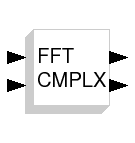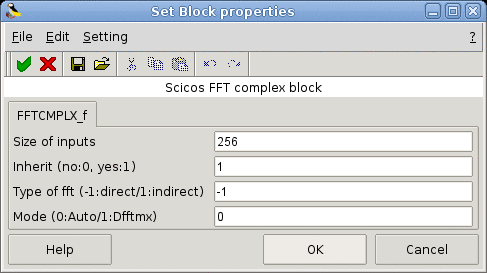Fast Fourier Transform block
That block computes a direct or backward Fast Fourier Transform. Regular inputs/outputs are the real and imaginary part of a complex number. They are vectorial.
The parameter Mode details which algorithms are used to compute the FFT.
If Mode=0 the interfacing function will automatically choose between the fft842 and dfftmx algorithms. The first are more powerful for computational time but only work for size of vectors with 2 power and for size less than 2^15. The second algorithm (dfftmx) can work for any size of vector but is more slow. If the size of the input vector is a 2 power and less than 2^15 fft842 will be used else this is dfftmx.
Mode=1 is to always use dfftmx.
If the 'Modnum' toolbox have been build with the FFTW library the block will automatically use that library in any case.
- Size of inputs
The size of the input vectors.
Type 'vec' of size 1.
- Inherit (no:0, yes:1)
Herits events by its regular input ports (disable the event input port).
Type 'vec' of size 1.
- Type of fft (-1:direct/1:indirect)
Use -1 for direct fft and 1 for indirect fft.
Type 'vec' of size 1.
- Mode (0:Auto/1:Dfftmx)
Use 0 to automatically switch betwenn fft842/dfftmx algorithms or force dfftmx with 1.
Type 'vec' of size 1.
- always active: no
- direct-feedthrough: yes
- zero-crossing: no
- mode: no
- regular inputs:
- port 1 : size [256,1] / type 1
- port 2 : size [256,1] / type 1
- regular outputs:
- port 1 : size [256,1] / type 1
- port 2 : size [256,1] / type 1
- number/sizes of activation inputs: 0
- number/sizes of activation outputs: 0
- continuous-time state: no
- discrete-time state: no
- object discrete-time state: no
- name of computational function: fftcmplx
- MODNUMCOS/macros/scicos_blocks/Signal/FFTCMPLX_f.sci [view code]
- MODNUMCOS/routines/signal/fftcmplx.c (Type 4) [view code]
IRCOM Group Alan Layec
- Signal Processing with Scilab. Available : signal.pdf
FFTW. Available : FFTW web site


